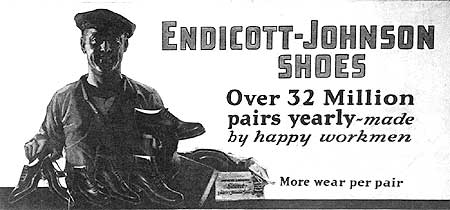home |
many pasts |
evidence |
www.history |
blackboard |
reference
talking history | syllabi | students | teachers | puzzle | about us
talking history | syllabi | students | teachers | puzzle | about us
Put on a happy face.
A 1923 billboard advertisement for Endicott-Johnson shoes touted employee satisfaction as an important feature of the product. Company president George F. Johnson was a leading proponent of “welfare capitalism,” or providing generous benefits to employees as a way to forestall high turnover and labor unrest. As part of this philosophy, Johnson paid the highest wages in the shoe industry, instituted an eight-hour day, and provided medical care for employees and their families. Although he believed generally that trade unions were necessary for redressing unfair labor practices, Johnson opposed the organization of workers in his own factories.

Source: April 5, 1923—Prints and Photographs Division, Library of Congress.
